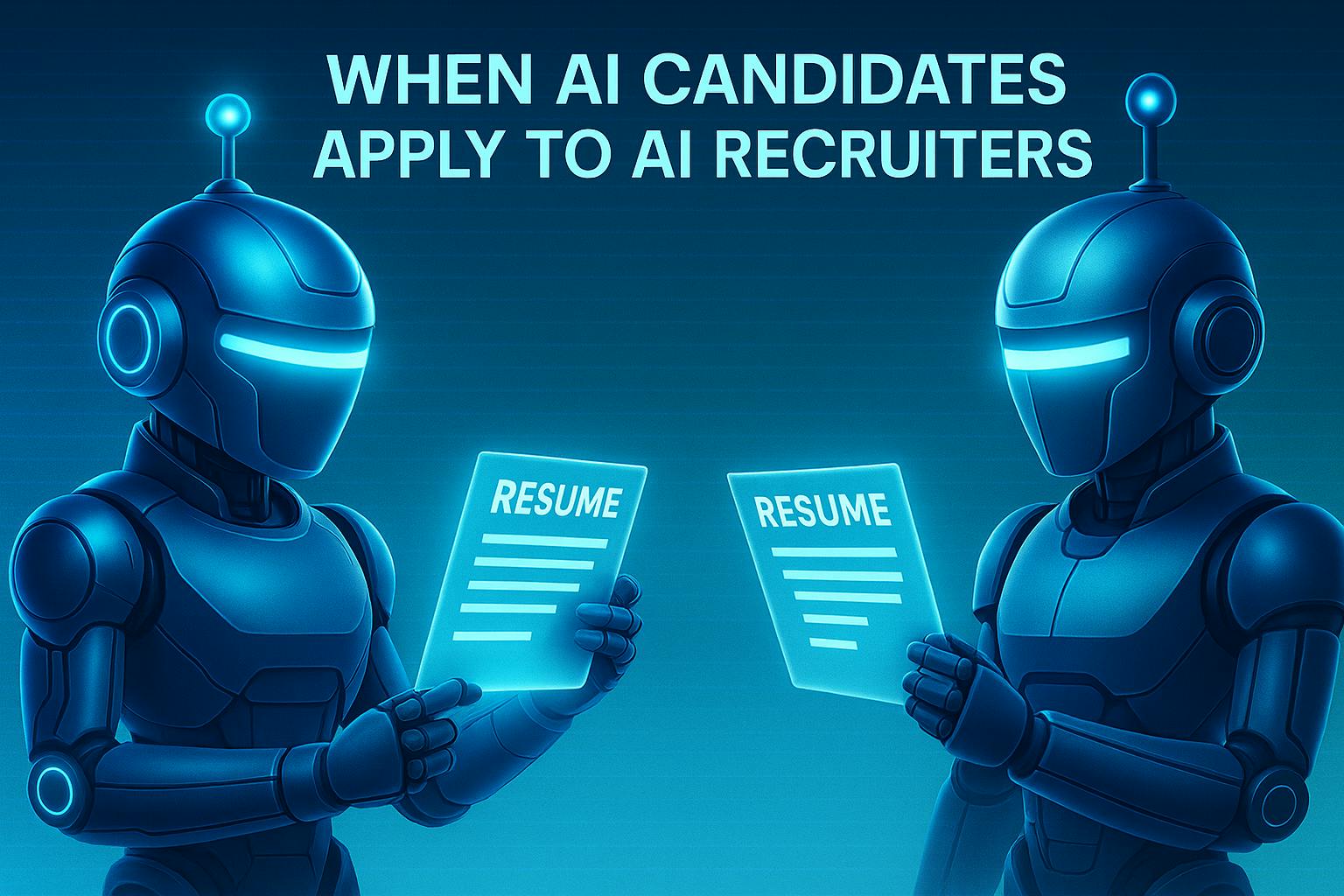I’m Raymond Guo, the cofounder of Noon AI, where we work with thousands of recruiting teams and companies that have quietly begun letting AI handle the early stages of hiring.
In the process, I’ve had a front row seat to how automation is reshaping the talent market. Over the past year, I’ve started noticing something unusual. Many candidates are now using AI tools of their own. They’re generating resumes, cover letters, and even automated job applications using GPT powered agents.
In other words, both sides of the hiring equation — recruiters and candidates — are now automating each other out of the conversation.
That observation led us to a question:
What happens when AI candidates start talking to AI recruiters?
The Job Market Is Quietly Turning Into an AI Arms Race
The modern hiring process has become an automation duel where both sides are deploying AI agents to outsmart each other.
Candidates are now using ChatGPT-powered bots to mass apply for hundreds of roles a day. Tools like LazyApply, Sonara, and Simplify can automatically generate cover letters, tailor resumes, and even schedule interviews. The result is a new era of application spam at scale.
Meanwhile, recruiters are responding with their own AI weapons. Resume screeners, candidate rankers, and automated outreach tools are becoming the new gatekeepers of opportunity. Human recruiters no longer read most applications. Algorithms do.
And so, the loop begins: bots applying to bots.
When Nobody Is Reading or Writing Anymore
On one side, AI candidates endlessly tweak resumes to pass through keyword filters. On the other, AI recruiters adjust their filters to detect AI-generated resumes.
It’s an arms race similar to SEO versus Google’s algorithm, except the stakes are people’s livelihoods.
Recruiting used to be about connection, finding alignment between ambition and opportunity. Now it’s a chess match between two language models, with human careers as the pieces.
The average recruiter spends less than seven seconds on a resume. The average candidate spends less than ten seconds personalizing an application. That’s not a talent market. That’s an API call.
The Automation Feedback Loop
Every automation creates counter automation.
- Candidates optimize prompts: “Write a cover letter that passes an ATS scan.”
- Recruiters counter: “Detect ChatGPT-generated resumes.”
- Candidates respond: “Rephrase to sound more human.”
- Recruiters add: “Evaluate sentence entropy for authenticity.”
At some point, nobody remembers who wrote what, yet the system hums along, evaluating synthetic text with synthetic logic.
The danger isn’t just efficiency. It’s meaninglessness. If both sides outsource judgment to AI, who’s left to decide what “fit” even means?
The Paradox of Efficiency
Automation promises to make recruiting faster. But if everyone automates, the noise returns, only faster.
A candidate’s advantage no longer comes from writing better. It comes from using slightly smarter AI.
A recruiter’s advantage no longer comes from empathy. It comes from training a slightly better model.
The market collapses into algorithmic symmetry, each side optimizing against the other until neither side has signal. The result is hiring entropy. Everything blends into noise.
Possible Futures
Scenario 1: Full Automation
AI agents apply, screen, interview, and negotiate with each other. Humans simply approve or reject outcomes. A job offer becomes the output of an API transaction.
Scenario 2: Algorithmic Collapse
Companies drown in noise and revert to referrals, networks, and curated shortlists. Hiring through humans becomes a premium experience, like artisan coffee in an age of vending machines.
Scenario 3: The Equilibrium
Humans re-enter only where context matters most: culture, creativity, trust. AI handles the filtering; humans handle the judgment.
The Recruiting Protocol
Here’s a thought: what if we stopped pretending these bots aren’t talking to each other and gave them a structured way to communicate?
Imagine a Recruiting Protocol, a standardized language where candidate agents and recruiter agents exchange structured data instead of spammy text.
Instead of “Dear Hiring Manager,” an AI agent could transmit:
{
"skills": ["Python", "TensorFlow", "Cloud Infrastructure"],
"experience_years": 5,
"career_intent": "Machine Learning Engineer",
"project_samples": ["github.com/example/project"]
}
Recruiter agents could respond with:
{
"required_skills": ["Python", "Kubernetes"],
"salary_band": "$140k-$160k",
"seniority": "Mid-Level"
}
No keyword stuffing. No fake personalization. Just structured, transparent, and fair communication, the equivalent of SMTP for hiring.
In this world, recruiting becomes a data exchange problem, not a guessing game.
And AI stops pretending to be human. It starts doing the jobbetter than we ever could.
The Human Opportunity
If AI automates the transactional layers, humans can finally focus on what actually matters:
- Defining the mission
- Calibrating culture
- Crafting environments where people do their best work
The more AI handles logistics, the more recruiting returns to its essence: understanding people.
Maybe the future isn’t about removing humans from hiring.
Maybe it’s about finally removing everything that isn’t human from hiring.


